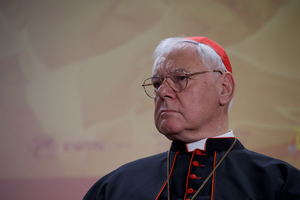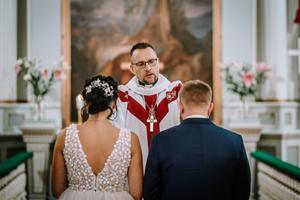Pope Francis’ Apostolic Letter Draws Mixed Reaction
Magnum Principium, issued motu proprio, shifts some responsibility for translating liturgical texts from the Vatican to bishops’ conferences.

VATICAN CITY — Pope Francis’ apostolic letter Magnum Principium, which shifts some responsibility for translating liturgical texts away from the Vatican to local bishops, has drawn mixed reactions.
Some liturgists have expressed concern that it will lead to a “free-for-all,” but others say it has enough safeguards in place to ensure authentic translations are produced.
Signed by the Holy Father Sept. 3 and published Sept. 9, Magnum Principium (The Great Principle) deals explicitly with two specific changes to Canon 838 of the Code of Canon Law, which addresses the authority of the Apostolic See and national episcopal conferences in preparing liturgical texts in vernacular languages.
Specifically, the document, issued motu proprio (on the Pope’s own initiative) introduces changes to two paragraphs of canon law, stating the Vatican will continue to have the authority to approve or reject a proposed translation, but it will no longer have a clear role in the final stage of the translation process.
The Congregation for Divine Worship and the Discipline of the Sacraments will no longer instruct bishops to make proposed amendments, but simply have authority to confirm or veto the results at the end of the process.
This means that the Vatican commission Vox Clara, which was established by Pope John Paul II in 2002 to help the Congregation for Divine Worship and the Discipline of the Sacraments vet English translations, will no longer be needed.
Pope Francis noted in the motu proprio that after the Second Vatican Council, the Church was acutely aware of “the attendant sacrifice involved in the partial loss of liturgical Latin, which had been in use throughout the world over the course of centuries.”
But he added that “it willingly opened the door” to vernacular liturgical translations, saying it was necessary to unite “the good of the faithful of a given time and culture” to a “conscious and active participation” in liturgical celebrations.
He went on to write that, given each translation must be “congruent with sound doctrine,” it is no surprise that certain problems have arisen between episcopal conferences and the Apostolic See along the way.
This means there must be “a vigilant and creative collaboration full of reciprocal trust” between the Apostolic See and bishops’ conferences so that the renewal of “the whole liturgical life might continue.” Francis said it therefore “seemed opportune that some principles handed on since the time of the Council should be more clearly reaffirmed and put into practice.”
In this sense, he stated he wanted “the competency” of the Apostolic See in translations to be “made clearer.” All changes will go into effect Oct. 1.
Earlier this year, Vaticanist Sandro Magister reported that the Holy Father had established a commission to review Liturgiam Authenticam (The Use of Vernacular Languages in the Publication of Books on the Roman Liturgy), the Congregation for Divine Worship's 2001 instruction that translations of liturgical texts closely follow the original Latin and other languages.
After much study and tireless efforts by episcopal conferences around the world over seven years, the Holy See approved a new English translation in April 2010. Most countries had put the new translation into effect by the end of November 2011.
Archbishop Arthur Roche, the secretary for the Congregation of Divine Worship, was reportedly the head of the commission assigned to study the issue. He previously served 10 years as the chairman of the main coordinating body for the new English translation, the International Commission for English Language in the Liturgy.
Cardinal Robert Sarah, prefect of the Congregation for Divine Worship, was not consulted for the motu proprio. The cardinal declined to answer questions about the document, and the archbishop did not respond to requests for comment.
Many liturgists, including some within the Vatican, believe that the intent of the motu proprio is quite obvious: to allow those opposed to new translations more faithful to the Latin to perhaps enact changes more to their liking, adding to already present discord and exacerbating the “liturgy wars,” although the document makes clear that texts must be translated faithfully.
Joseph Shaw of the Latin Mass Society in the United Kingdom said there was a danger that Magnum Principium could turn out like Memoriale Domini in 1969, the Vatican instruction on the manner of distributing Holy Communion.
That instruction was a response to a worldwide survey of bishops on the reception of Communion in the hand. The document reaffirmed the traditional practice of Holy Communion on the tongue, but it also said that the Holy See would consider requests from bishops’ conferences for permission for Communion in the hand if the request was backed by a two-thirds majority.
“The practical result was that the door to Communion in the hand was officially opened,” said Shaw. “Not only did bishops’ conferences make the request, but today it is regarded as odd if they have not, and reception in the hand is now regarded as the norm. The will to refuse bishops’ conferences’ request for the permission did not, for most cases, exist.”
Shaw added that Magnum Principium similarly insists on bishops’ conferences following Liturgiam Authenticam.
“It inserts the word ‘faithful’ into the wording of canon law with reference to liturgical translations, and it reserves the right of the Holy See to veto proposed translations,” he said.
“But these words will have no effect if there is no will in Rome to enforce them,” Shaw continued. “The document is being read as easing Rome’s control over translations, and it could easily lead to a free-for-all.”
But others say the motu proprio is, on the surface at least, water-tight, and only an explicit change in the law would allow for abuse, especially as the texts have to be submitted to Rome.
They allude to the point made by Archbishop Roche, in a letter accompanying the document, in which he states that the Vatican’s “confirmation” is an “authoritative act” that “presupposes a positive evaluation of the fidelity and congruence of the texts.”
For Salesian Msgr. Markus Graulich, the undersecretary at the Pontifical Council for Legislative Texts, enough safeguards are therefore in place.
“It’s enough because the congregation will confirm it [the bishops’ translations] and confirmatio (verification) is more than recognitio (recognition),” he said.
Others with knowledge of the issue say much will depend on who is running the Congregation for Divine Worship, but this has always been the case. Msgr. Graulich further observed that Magnum Principium means it is no longer possible for all English-speaking Catholics around the world to have the same English missal. But this is a positive development, he believes, as, for example, in some parts of Africa they have had difficulties with the new translated response “And with your spirit” instead of the previous, “And also with you.”
But also problematic in the document, say Shaw and others, is a misrepresentation — in the document’s first paragraph — of what the Second Vatican Council authorized in terms of vernacular translations. It states that the “great principle” established by the Council “required the weighty task of introducing the vernacular language into the liturgy and of preparing and approving the versions of the liturgical books, a charge that was entrusted to the bishops.”
But Sacrosanctum Concilium, the Second Vatican Council’s constitution on the sacred liturgy, stated that “the use of the Latin language is to be preserved in the Latin rites,” while use of the vernacular “may be extended” when it may be “of great advantage to the people” (36).
Writing in the New Liturgical Movement, Peter Kwasniewski, a professor of theology at Wyoming Catholic College, said it is true that “a number of Council Fathers spoke out strongly in favor of greatly increasing the role of the vernacular; but they were a minority.”
He said there were many more “who admitted that [the vernacular’s] use should be expanded in certain situations, while not displacing the customary Latin,” and there were many others who “adamantly reaffirmed the primacy of Latin due to qualities frequently acknowledged by the magisterium of the Church, such as its antiquity, longevity, stability and universality.”
This being the case, Shaw said it therefore “behooves defenders of Sacrosanctum Concilium, like defenders of the traditional liturgy, to explain how the use of Latin does not necessarily impede worshippers’ engagement with the liturgy.”
“As Pope St. John Paul II explained, ‘through its dignified character [the old liturgy in Latin] elicited a profound sense of the Eucharistic Mystery’ (Dominicae Cenae, 23),” Shaw said.
But in addition to the debate over whether Vatican II actually authorized such widespread use of the vernacular, also of concern is the extent to which translations will be decentralized. During the Council, the Fathers were split almost evenly between those who wanted considerable decentralization and those who, on the contrary, warned repeatedly about the deleterious consequences of leaving liturgical decisions to local bodies.
Pope St. John Paul II and Benedict XVI fought hard against the centrifugal tendency caused by the vernacularization and adaptation of the liturgy, an effort that culminated in Liturgiam Authenticam, the 2001 Congregation for the Doctrine of the Faith instruction to ensure that, “insofar as possible,” texts must be translated “integrally and in the most exact manner.”
The concern now — even though Archbishop Roche insists the motu proprio will uphold the guiding principle of Liturgiam Authenticam — is that the emphasis on decentralization will undo the work of the two popes.
Shaw believes it is legitimate to be “concerned about the limited resources of many bishops’ conferences if they are expected to take the lead in commissioning translations.” Lack of expertise, he said, “could lead to poor translations, and with non-major languages it would be difficult for the Congregation for Divine Worship to check them.”
Another liturgical scholar, speaking to the Register on condition of anonymity, believes that although the document does not make any change in the actual laws that govern liturgical celebrations, its danger lies elsewhere.
“As with Amoris Laetitia, which technically ‘makes no changes,’ Magnum Principium introduces a new drift or trend that will embolden those who are already chronic liturgical abusers,” he said, adding that he believes it will make it “more difficult for conservative and traditional clergy who are patiently working to right the wrongs of the past decades.”
And yet, Msgr. Graulich and others are confident that a Vatican veto of translations coming from bishops’ conferences will be a sufficient check. One Vatican source said he was “no more worried than before,” and he was particularly heartened by the document’s emphasis on “authentic interpretation.”
“The situation before was that the Holy See may choose not to intervene whatsoever and so not do its duty,” he said. “On the other hand, now the congregation can be quite aggressive in defending these norms.” He also pointed out that questions of cultural norms continue to be ruled out and not entrusted to bishops. The bishops remain “custodians of the one liturgy, and that’s it,” he said.
Also, although the motu proprio advocates decentralization, it does not go as far as some people had feared in that respect, or as far as some who favor a more progressive, less traditional liturgy, had hoped.
“It’s a clarification,” said a source close to the process. “Certainly, it does not tally with the great rumors that Pope Francis would make this great act of subsidiarity and decentralization and entrust all work to the bishops’ conferences,” he said. “That’s not at all happened.”
“We’ll see how it works,” said Msgr. Graulich. “I hope it’ll work, and this will be shown by the praxis.” He also said the translations are all in place, and so for the foreseeable future, “there won’t be any new translations.”
Edward Pentin is the Register’s Rome correspondent.


















